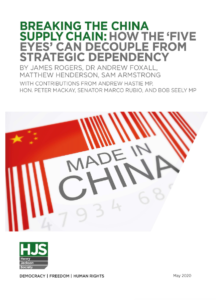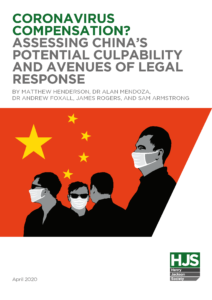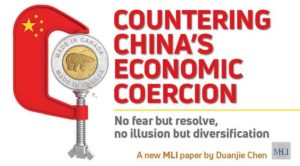 The inability to produce and source Personal Protective Equipment via globalized supply chains has reminded democratic governments and peoples that it is necessary to be able to produce strategic commodities, just as China’s actions and behavior have reminded them of the authoritarian nature of the Chinese Communist Party (CCP), notes a new analysis.
The inability to produce and source Personal Protective Equipment via globalized supply chains has reminded democratic governments and peoples that it is necessary to be able to produce strategic commodities, just as China’s actions and behavior have reminded them of the authoritarian nature of the Chinese Communist Party (CCP), notes a new analysis.
Is it geopolitically wise for democracies to remain dependent on foreign suppliers, particularly when some of those suppliers have grown more authoritarian, dissatisfied and revisionist, as well as determined to secure global technological dominance? The Henry Jackson Society asks in a new report, Breaking the China Supply Chain: How the ‘Five Eyes’ can Decouple from Strategic Dependency.
 The analysis uses “Comtrade” data, compiled by the UN, of 5910 subsets of goods to gauge “strategic dependency” – i.e., when more than 50% of imports of a particular good are from China, when it is a net importer of such goods, and when China controls more than 30% of the global market. All of the ‘Five Eyes’ democracies are affected, HJS adds:
The analysis uses “Comtrade” data, compiled by the UN, of 5910 subsets of goods to gauge “strategic dependency” – i.e., when more than 50% of imports of a particular good are from China, when it is a net importer of such goods, and when China controls more than 30% of the global market. All of the ‘Five Eyes’ democracies are affected, HJS adds:
- Australia is strategically dependent on China for 595 categories of goods. 167 of these have applications in critical national infrastructure.
- New Zealand is strategically dependent on China for 513 categories of goods. 144 of these have applications in critical national infrastructure.
- The US is strategically dependent on China for 424 categories of goods. 114 of these have applications in critical national infrastructure.
- Canada is strategically dependent on China for 367 categories of goods. 83 of these have applications in critical national infrastructure.
- The UK is strategically dependent on China for 229 categories of goods. 57 of these have applications in critical national infrastructure.
Values not for sale
 U.S. Senator Marco Rubio calls for “coalition-centered strategies to boost resilience” across the Five Eyes, warning that “how we respond to the challenges posed by China will define the 21st century”.
U.S. Senator Marco Rubio calls for “coalition-centered strategies to boost resilience” across the Five Eyes, warning that “how we respond to the challenges posed by China will define the 21st century”.
It is time to remind the world that our values are not for sale and that we will no longer brook any compromises about asserting them, note Rt Hon. Gisela Stuart, a former Labour Member of Parliament in the UK, and Hon. Michael Danby, a former Australian Labour MP and former Steering Committee member of the World Movement for Democracy.
As we rebuild our world from this present upheaval, the time has arrived for us to make trade and investment decisions with thought not just on finances but on security and human rights, they write in the Foreword. RTWT
A study from the UK’s University of Southampton found that if Beijing had acted just three weeks sooner, the number of covid-19 cases might have been reduced by 95 percent — which would have prevented a pandemic, The Post reports.







